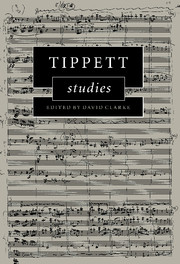Book contents
- Frontmatter
- Contents
- Preface
- References to Tippett's scores and essays
- 1 ‘Only half rebelling’: tonal strategies, folksong and ‘Englishness’ in Tippett's Concerto for Double String Orchestra
- 2 From pastiche to free composition: R. O. Morris, Tippett, and the development of pitch resources in the Fantasia Concertante on a Theme of Corelli
- 3 ‘Is there a choice at all?’ King Priam and motives for analysis
- 4 Tippett's Second Symphony, Stravinsky and the language of neoclassicism: towards a critical framework
- 5 Tippett, sequence and metaphor
- 6 Tonal elements and their significance in Tippett's Sonata No. 3 for Piano
- 7 ‘Significant gestures to the past’: formal processes and visionary moments in Tippett's Triple Concerto
- 8 Tippett's King Priam and ‘the tragic vision’
- 9 Tippett at the millennium: a personal memoir
- 10 Decline or renewal in late Tippett? The Fifth String Quartet in perspective
- Appendix: glossary of terms used in pitch-class set theory
- Index
2 - From pastiche to free composition: R. O. Morris, Tippett, and the development of pitch resources in the Fantasia Concertante on a Theme of Corelli
Published online by Cambridge University Press: 22 September 2009
- Frontmatter
- Contents
- Preface
- References to Tippett's scores and essays
- 1 ‘Only half rebelling’: tonal strategies, folksong and ‘Englishness’ in Tippett's Concerto for Double String Orchestra
- 2 From pastiche to free composition: R. O. Morris, Tippett, and the development of pitch resources in the Fantasia Concertante on a Theme of Corelli
- 3 ‘Is there a choice at all?’ King Priam and motives for analysis
- 4 Tippett's Second Symphony, Stravinsky and the language of neoclassicism: towards a critical framework
- 5 Tippett, sequence and metaphor
- 6 Tonal elements and their significance in Tippett's Sonata No. 3 for Piano
- 7 ‘Significant gestures to the past’: formal processes and visionary moments in Tippett's Triple Concerto
- 8 Tippett's King Priam and ‘the tragic vision’
- 9 Tippett at the millennium: a personal memoir
- 10 Decline or renewal in late Tippett? The Fifth String Quartet in perspective
- Appendix: glossary of terms used in pitch-class set theory
- Index
Summary
I
Presenting a musical analysis of Tippett's Fantasia Concertante on a Theme of Corelli (1953), or of any other work for that matter, brings a number of discernible objects into juxtaposition. In particular, one musician's conception of the piece is set alongside its written score: the analyst's musical understanding is rationalised as explanations of how he or she comprehends certain passages, and these explanations are communicated through various verbal and graphical constructions around the score itself. In this process, the score is taken to represent a common ground between the author of the analysis and those who may read it; beyond this, further common ground is assumed in the shape of concepts from music theory which mediate (explicitly or otherwise) the analyst's introspections–whether these introspections be about the experience of reading the score, or about the experience of listening to a performance, or about the imaginary listening experience that often accompanies score-reading. The rather obvious objections that such experiences cannot literally have been shared, and that the concepts of music theory may not carry the same nuances of meaning for all parties involved, seem in general to be overridden by a belief that in practice there is a tangible communality that permits musicians to accomplish something in this way.
The composer, too, is generally drawn into this network. Indeed, listeners may readily feel that they understand a musical work through some kind of empathy with the composer, a process of imagination to which explicit analysis is hardly essential.
- Type
- Chapter
- Information
- Tippett Studies , pp. 27 - 54Publisher: Cambridge University PressPrint publication year: 1999



